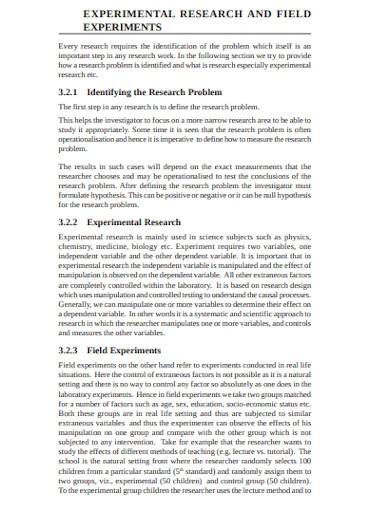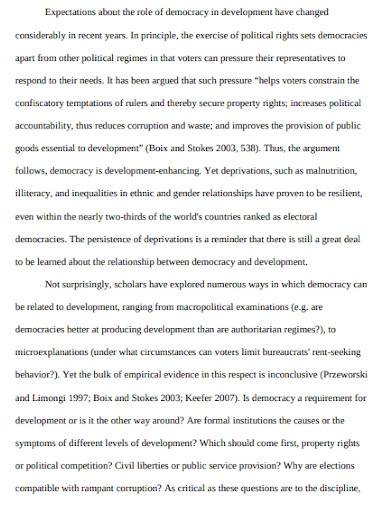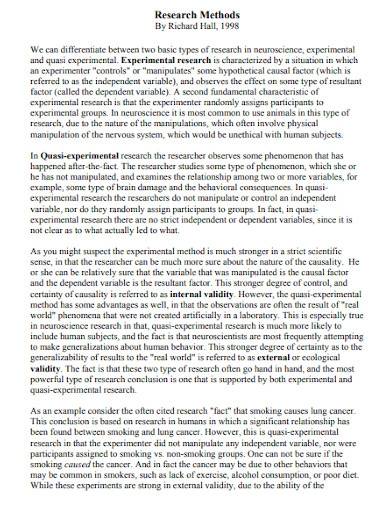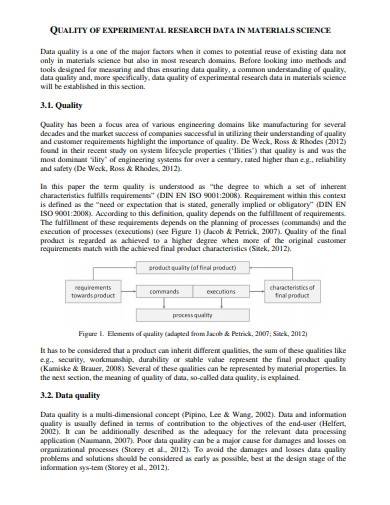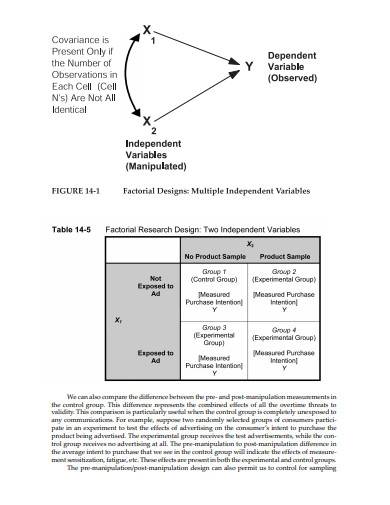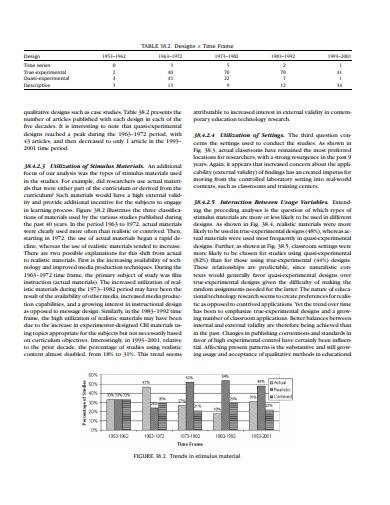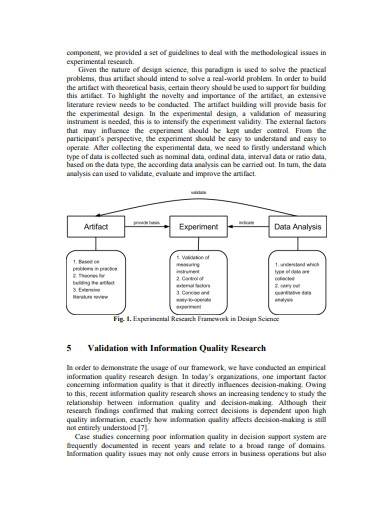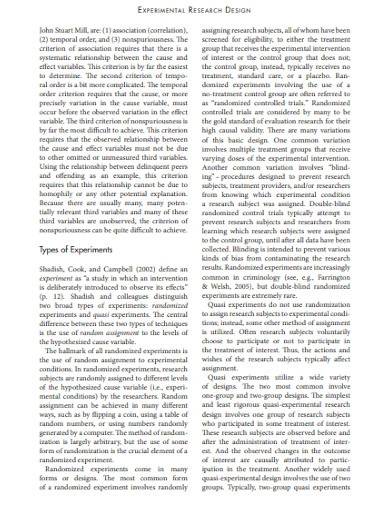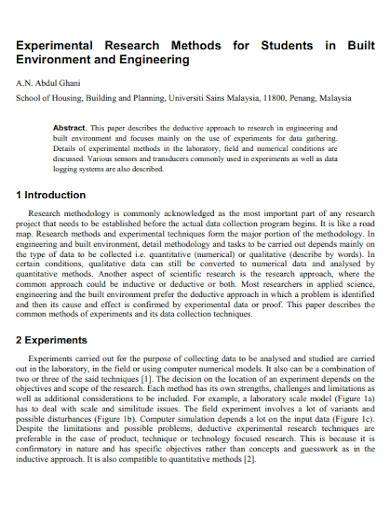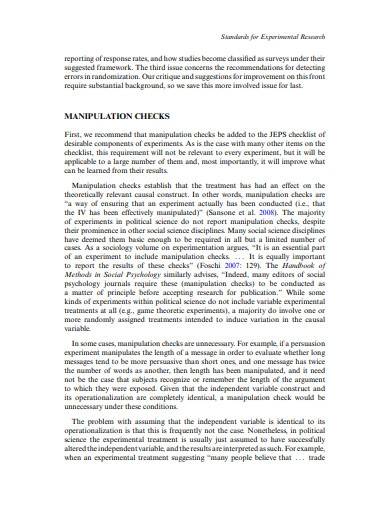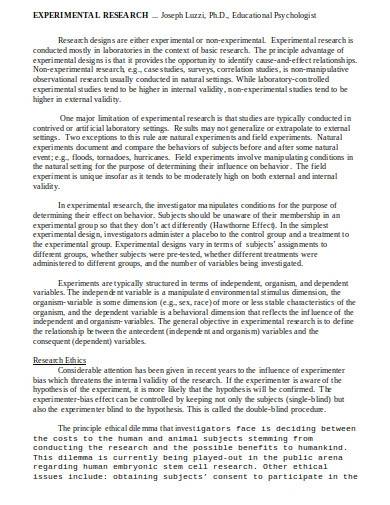One of the key features of experimental research framework is the manipulation of one or more independent variables. These variables are the factors that can be controlled and varied by the researcher. The dependent variable, on the other hand, is the outcome that is measured and observed as a result of the manipulation of the independent variable. By manipulating the independent variable, the researcher can establish a causal relationship survey between it and the dependent variable. This is a powerful tool for understanding the underlying mechanisms of various phenomena and for testing the efficacy of behavior intervention plan.
FREE 10+ Experimental Research Samples & Templates in MS Word | PDF
1. Experimental Research and Field Experiment
2. Experimental Research on Democracy
3. Experimental Research Method Template
4. Basic Experimental Research Template
5. Environments Experimental Research Template
6. Simple Experimental Research Method
7. Experimental Information Research Template
8. Sample Experimental Research Design
9. Studens Experimental Research Sample
10. Professional Experimental Research
11. Experimental Research Format Template
What is Experimental Research?
Experimental research is a scientific method that is used to establish cause-and-effect relationships between variables. It involves manipulating one or more independent variables in order to observe and measure the effects of these manipulations on one or more dependent variables. In this essay, we will discuss the key features of experimental research, its advantages and disadvantages, and some of its applications in various fields.
How To Make Experimental Research?
One of the advantages of experimental research is its ability to establish cause-and-effect relationships. By manipulating the independent variable and controlling for other factors, the researcher can determine whether changes in the dependent variable are directly caused by the manipulation of the independent variable. Here are the basic steps involved in conducting an experimental research study plan:
Step 1- Formulate Research Question
The first step in conducting experimental research is to identify a research question or business hypothesis that can be tested through experimentation. The research question should be specific, measurable, or must have SMART goal statement and answerable through experimental methods.
Step 2- Define Independent and Dependent Variable
Identify the independent variable(s) and dependent variable(s) that will be measured in the study. The independent variable is the variable that will be manipulated in the study, while the dependent variable is the variable that will be measured to determine the effect of the independent variable.
Step 3- Design the Experiment
Design the experimental procedure documentation samples, including the experimental groups and the control group. The experimental group is the group of participants who will be exposed to the independent variable, while the control group is the group of participants who will not be exposed to the independent variable.
Step 4- Recruit Participants
Recruit participants through recruitment plan for the study, making sure to select a sample that is representative of the population being studied. Conduct the experiment according to the designed policy and procedure, making sure to control for extraneous variables that could affect the results.
What are the key features of experimental research?
The key features of experimental research include the manipulation of one or more independent variables, the measurement of one or more dependent variables, the use of a control group, and the ability to establish cause-and-effect relationships.
What are some applications of experimental research?
Experimental research has many applications in various fields, including psychology case study, medicine, and educational research. It is used to study topics such as memory, learning, motivation, and the efficacy of treatments and interventions.
What is a control group in experimental research?
A control group is a group of participants who do not receive the treatment or intervention being studied. By comparing the outcomes of the treatment group with those of the control group, the researcher can determine whether the intervention is effective or not.
In conclusion, experimental research is a powerful scientific method that is used to establish cause-and-effect relationships between variables. Its ability to manipulate independent variables and control for extraneous variables makes it a valuable tool for understanding the underlying mechanisms of various phenomena and for testing the efficacy of interventions. While there are some limitations to experimental research, it has many applications in various fields and continues to be an important tool for advancing scientific knowledge.
Related Posts
FREE 10+ Content Validity Samples & Templates in PDF
FREE 10+ Construct Validity Samples & Templates in MS Word | PDF
FREE 10+ Code of Human Research Ethics Samples & Templates in MS Word | PDF
FREE 10+ Biography Research Report Samples and Templates in PDF
FREE 10+ System Documentation Samples & Templates in MS Word | PDF
FREE 10+ Process Document Samples & Templates in MS Word | PDF
FREE 10+ Action Research Samples & Templates in PDF
FREE 10+ Longitudinal Research Samples & Templates in PDF | MS Word
FREE 10+ Causal Research Samples & Templates in MS Word | PDF
FREE 10+ Client Discovery Samples & Templates in MS Word | PDF
FREE 10+ Null Hypothesis Samples & Templates in MS Word | PDF
FREE 9+ Product Knowledge Samples & Templates in PDF
FREE 10+ Software Documentation Samples & Templates in MS Word | PDF
FREE 10+ Exploratory Research Samples & Templates in PDF | MS Word
FREE 10+ Descriptive Research Samples & Templates in PDF

